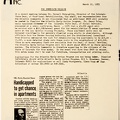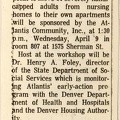Essay
[Headline] Whaddya Know, Something Gets Done
[Subheading] The Handicapped Get Some Hope
On Thursday, February 27, the Colorado Department of Social Services announced the granting of $14,500 to a group of the disabled for the purpose of altering seven public housing units at the Las Casitas housing project in Denver in order to accommodate the handicapped.
Aside from the official glee about cooperation between the federal, state and local governments, the exciting element in the story is the force which about such cooperation.
The force which brought city, state and federal governments into the Social Services Building for the announcement of this project was a group of the physically handicapped operating under the name "Atlantis." The group has been in formation and operation for over two years. During that time it has requested, cajoled, picketed and threatened the
aforementioned governments.
The governments met these repeated approaches with concern and disclaimers.
The change which brought about the new project is traceable to continued pressure by the Atlantis group and changes in elected officials within the last five months. The key which unlocked the final door was the approval of Henry Foley as director of Social Services for the state. Within one week, the position of the State Social Services Department went from obfuscation to cooperation. The change was brought about by the approval of Foley.
The purpose of Atlantis was not suited to the outlook of the state bureaucracy. Atlantis is not merely building housing. The housing is viewed as a tool to achieve self-sufficiency and dignity in the lives of the disabled. By establishing the housing which will achieve a physical presence for the community, Atlantis is hopeful of bringing enough abilities and skills together to achieve a completely independent life style to their members.
The history of the treatment of handicapped young adults has been one of miserable failure. Generally, a young adult with a disabling physical handicap has been sent to a nursing home. These institutions are conceived as warehouses for the infirm. This approach has served profitably in the care of the terminally ill and the elderly. But young adults with active minds do not respond favorably to being treated as sides of beef.
It must be understood that young adults are basically as alive as a worker, black, chicano or woman. As these deprived members of society have fought to be considered as human beings. so now the disabled are asking for complete membership in the human race. So, when a young paraplegic in a nursing home gets fed up with his life, he feels it is his right to go out and hoist a few to fuzz over his dissatisfaction.
Imagine the reactions of a nursing home which is used to treating its patients as inmates when one of its tenants comes wheeling into the lobby at 2:00 a.m. singing nautical chants at the top of his lungs. The nursing home tends to view such a patient as a troublemaker instead of a young adult who has had an experiment blow up in his face. The response is generally to clamp down on opportunities rather than delight in the humanity of the patient.
Atlantis is on the road to assembling a program which will allow its members to expand to their capacity. ln order to accomplish this goal. they require extensive aid from the rest of us. The program at the Las Casitas project involves health care as furnished by the West Side Neighborhood Health Center, the buildings as furnished by the Denver Housing Authority, transportation as will hopefully be furnished by the Regional Transportation District (although this program has been an unqualified joke), remodeling as furnished through State Social Services and welfare moneys as provided by the feds and state government.
The state and federal governments presently spend about $500 per month for housing each handicapped person in nursing homes. Preliminary estimates show that this new and experimental program at Las Casitas will cost in the neighborhood of $350 per month. Even if costs were the same, the value of giving hope and dignity to the disabled would certainly justify the expenditure.
Anonymous
The writer has long been a critic of care for the handicapped, but wishes to remain anonymous in this instance for business reasons.
- Created on
- Wednesday 10 July 2013
- Posted on
- Sunday 21 February 2016
- Tags
- Atlantis, Colorado Social Services, Dr. Henry Foley, full potential, grants, nursing home alternative, nursing homes, pressure, young disabled people
- Visits
- 2030
- Rating score
- no rate
- Rate this photo


0 comments